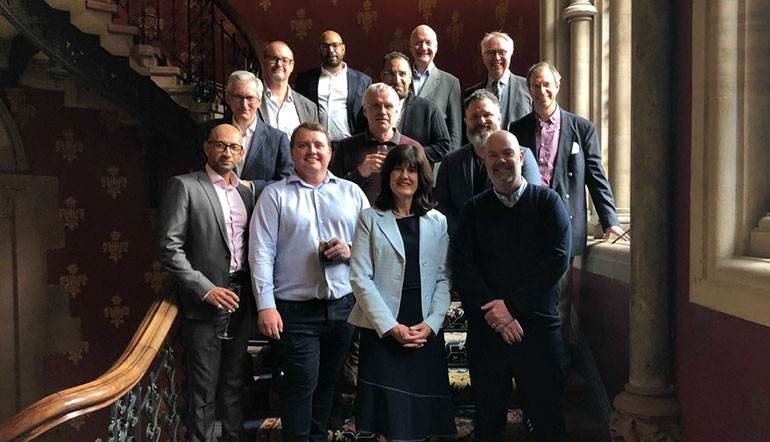Building the agile campus of the future through the lens of business composability

A recap of the UCISA & Ellucian roundtable
In this recap of the UCISA roundtable, sponsored by Ellucian on May 5th, 2022, Matt Searles, Vice President — Europe and Asia Pacific, recounts the discussed needs for agility across Higher Education, the relevance of business composability for the campus of the future, and the challenges Higher Education institutions are facing to implement fully agile systems.
Business composability applies modularity to a business asset - people, processes, technologies, and event physical assets - so that leaders can easily and safely recompose them and create new value in times of flux.
Gartner1
Business composability, as defined by Gartner, is highly relevant for the Higher Education (HE) sector in today’s climate. The pandemic and ever-evolving student expectations - recently highlighted in the record numbers of student complaints for the 2020/2021 academic year – have accelerated the pace of which technological change is required by and of HE institutions. It has become clear, that agility is a key demand across HE, however, in a recent conversation between UCISA and Gartner, members voiced that organisational structures, funding, and the complexity of their existing student information systems are a barrier to achieving a truly agile campus.
The UCISA roundtable sponsored by Ellucian on May 5th, aimed to further bring these challenges to the forefront of the conversation as well as openly discuss what the sector should be aiming for, how it might overcome these challenges to improve performance and user experience, and how all of this might be achieved even during times of rapid change and uncertainty. The roundtable was attended by representatives from SOAS, University of Brighton, University of Surrey, Kingston University, King's College London, University of the Arts London, University of Bedfordshire, and Regent’s University.
Is composability a relevant frame of reference for HE in times of rapid change?
The purpose and mission of universities varies significantly between institutions, however, our debate around composability revealed that the majority of HE institutions feel the need to build the agile campus of the future. Higher education data and systems expert, Andy Youell, started the roundtable by exploring the definition of business composability and its reference to HE, arguing that composability allows universities to employ a new way of presenting data and adopt a more coherent, modular approach. As a result, the benefits of implementing composability across HE institutions are manifold, delivering greater agility, responsiveness, empowerment, and trust.
Yet, the implementation of composability is less straight-forward than its benefits, due to the deeply ingrained legacy of universities, with its complex hierarchies, strong rules, and need for accreditation. And while it was widely acknowledged by the members of the roundtable that an agile campus could be achieved through composability, the cultural changes that would need to be achieved provide HE with a challenge.
So, what needs to change in order to achieve agility across HE?
The greatest benefit of composability for the HE sector is the ability to react to change quickly and in a less bureaucratic manner. While it was mutually agreed that composability is a useful approach to overcome current challenges, processes, organisational administration, and institutional culture have to adapt if the HE sector wants to become truly agile. In order to champion cultural change at HE institutions, the 3 building blocks of Gartner’s2 composability approach offer a pragmatic approach to challenge the status quo and introduce a more modular way of thinking.
Firstly, ‘composable thinking’ argues that by combining “the principles of modularity, autonomy, orchestration, and discovery with composable thinking” our way of thinking can be guided to think conceptually and not lose our creativity. This building block is important to be considered by each individual involved in the decision making and implementation of composability to ensure a joined mindset built on shared values and beliefs.
As a member of the roundtable pointed out rightly, composable thinking at its core definition is at the heart of Higher Education, from creating new course offerings to moving students between departments – composability is something the sector has always done naturally. However, what is needed to truly make the sector agile and apply the framework of composability across the whole sector is arguably a unified strategy, including systematic tools and approaches that allow institutions to optimise processes, administration, and by extension reform organisational culture to become truly adaptable.
The second building block of “composable business architecture” is particularly relevant at an institutional level, ensuring that universities are flexible and resilient by analyzing structures and purpose to optimise structural capabilities. However, “composable technologies” is the building block that refers to the tools that will create the agile and composable future for the institution, including all the parts and pieces and the framework that holds them all together, which is what this roundtable was particularly invested in.
One starting point to embed composable technologies is to optimise current IT systems at a strategic level. Ellucian has long since placed the focus on providing an interoperable platform with tools and a ‘business capability’ based implementation approach which directly relates to composability. We maintain that anything that does not add value to an institution, anything that does not help to differentiate one institution from the next or give it a competitive edge, is just plain business as usual and should therefore be delivered ‘out of the box’. By implementing these tools, institutions get faster returns at lower risk, with fewer resources and lower costs.
What institutions should aim for is optimising their processes to simplify them. For example, maintaining multiple processes across faculties and departments to deal with standard scenarios such as course transfers/deferrals/withdrawals is inefficient and unnecessary. By implementing a capability approach such as offered by Ellucian, institutions can apply composability and move to a truly agile model, which will help set them apart from one another. A simplified platform with tools that enable the institution to rapidly adjust to new requirements is a pre-requisite for the future agility of your organisation.
A unified strategy for competitors – possibility or futility?
While voices are calling for unified strategies, UK HE institutions are inherently characterised by ‘co-opetition’, being simultaneously cooperative and collaborative. It’s this characteristic that has created organisations like UCISA, JISC and UCAS where the sector collaborates for mutual gain alongside individual. UCAS for example, showcases how well the sector can pull together, with the benefits of coordination highly visible to create a standardised, simplified admissions clearing house whilst JISC and UCISA deliver centralised services, collaborative engagements and thought leadership to the sector. If we applied a similar model to wider organisational processes, core processes could be standardised across the sector taking the UCISA capability model and putting it into practice.
Student systems are at the heart of what HE institutions do, and it was mentioned more than once during our roundtable conversation that easier interaction between different parts of the system would be beneficial and meet the definition of composability. But as Deborah Green, Chief Executive at UCISA, raised, the conversation also needs to happen at the registry level. CIOs are already very aligned with the notion of composability and are eager to implement systems that are unified and agile. Ellucian is equally keen to reach out to our wider registry community in Europe to join the conversation and I invite you to please reach out and get in touch if you would like to be involved in future events on this topic.
To download Gartner's 2022 CIO and Technology Executive Agenda report, please visit: https://www.ellucian.com/emea-ap/landing-pages/gartner-report.
If you would like to find out more about Ellucian's approach, please visit: https://www.ellucian.com/emea-ap/all-the-possibilities.

1 2022 CIO Agenda Higher Education Perspective for UCISA, Dr Jan-Martin Lowendahl
2 https://www.gartner.com/smarterwithgartner/gartner-keynote-the-future-of-business-is-composable




